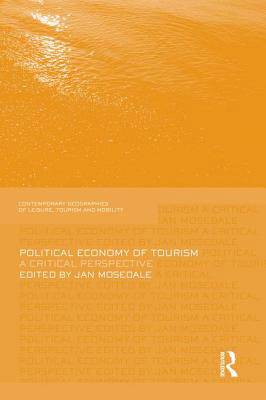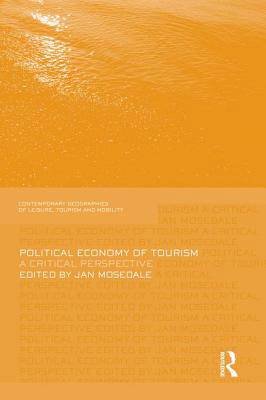
- Retrait gratuit dans votre magasin Club
- 7.000.000 titres dans notre catalogue
- Payer en toute sécurité
- Toujours un magasin près de chez vous
- Retrait gratuit dans votre magasin Club
- 7.000.000 titres dans notre catalogue
- Payer en toute sécurité
- Toujours un magasin près de chez vous
Political Economy of Tourism
A Critical Perspective
Description
Political economy, in its various guises and transfigurations, is a research philosophy that presents both social commentary and theoretical progress and is concerned with a number of different topics: politics, regulation and governance, production systems, social relations, inequality and development amongst many others. As a critical theory, political economy seeks to provide an understanding of societies - and of the structures and social relations that form them - in order to evoke social change toward more equitable conditions.
Despite the early influence of critical development studies and political economy on tourism research, political economy has received relatively little attention in tourism research. Political Economy and Tourism the first volume to bring together different theoretical perspectives and discourse in political economy related to tourism. Written by leading scholars, the text is organised into three sequential Parts, linked by the principle that 'the political' and 'the economic' are intimately connected. Part one presents different approaches to political economy, including Marxist political economy, regulation, comparative political economy, commodity chain research and alternative political economies; Part two links key themes of political economy, such as class, gender, labour, development and consumption, to tourism; and Part three examines the political economy at various geographical scales and focuses on the outcomes and processes of the political act of planning and managing tourism production.
This engaging volume provides insights and alternative critical perspectives on political economy theory to expand discussions of tourism development and policy in the future. Political Economy and Tourism is a valuable text for students, researchers and academics interested in Tourism and related disciplines.
Spécifications
Parties prenantes
- Editeur:
Contenu
- Nombre de pages :
- 288
- Langue:
- Anglais
- Collection :
Caractéristiques
- EAN:
- 9781138880689
- Date de parution :
- 26-08-15
- Format:
- Livre broché
- Format numérique:
- Trade paperback (VS)
- Dimensions :
- 155 mm x 229 mm
- Poids :
- 453 g






